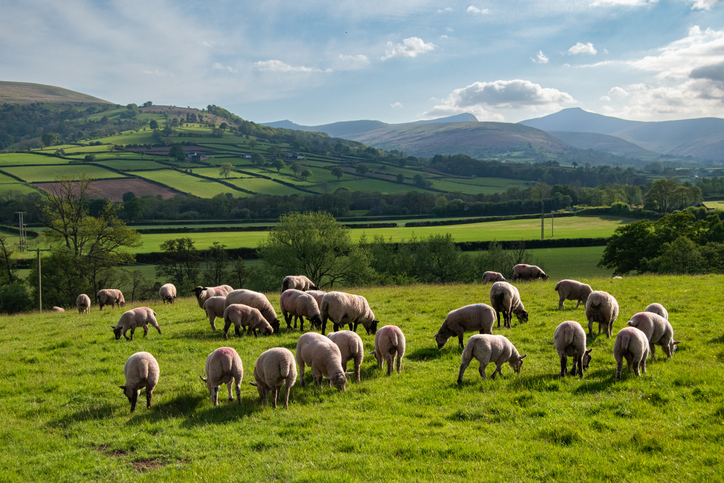UK Imposes Import Ban on Livestock from Germany Amid Foot-and-Mouth Disease Outbreak
In a precautionary move to protect the UK’s agricultural sector, the government has implemented a ban on the importation of cattle, pigs, and sheep from Germany after a confirmed case of foot-and-mouth disease. This disease, although rarely affecting humans, is highly contagious among cloven-hoofed animals, including cattle, pigs, and sheep. The UK remains free from reported cases of foot-and-mouth disease, but the government’s swift action aims to maintain this status and prevent any potential outbreaks.
The new restriction, confirmed by the UK government on Tuesday, prevents the approval of health certificates for animals, fresh meat, and animal products that are vulnerable to foot-and-mouth disease. This move is seen as essential in keeping the disease from crossing borders and jeopardizing the UK’s livestock industry. The government’s decision also signals its commitment to protecting the UK’s farming sector, which has already faced significant challenges in recent years.
Foot-and-Mouth Disease and Its Impact
Foot-and-mouth disease is an infectious viral disease that primarily affects cloven-hoofed animals. While it doesn’t pose a direct threat to humans, its impact on the livestock industry can be devastating. Infected animals often develop blisters and sores on their feet, mouth, and tongue, leading to lameness, fever, and reluctance to eat. In severe cases, the disease can result in the culling of infected livestock to prevent the spread of the disease.
The UK’s agricultural sector is particularly vulnerable to foot-and-mouth outbreaks, as the disease spreads rapidly through animal-to-animal contact and contaminated surfaces. When the disease spread to the UK in 2001 and 2007, it led to the culling of millions of animals, causing severe financial losses to farmers and the economy at large. These outbreaks also resulted in restrictions on exports, disrupting international trade in livestock and livestock products.
Government Response to Foot-and-Mouth Risk
Farming Minister Daniel Zeichner emphasized the government’s proactive approach to protecting farmers and their livestock. The ban on animal imports from Germany is a crucial first step in preventing the disease from reaching UK shores. However, the government has indicated that additional countries may be added to the ban list if foot-and-mouth disease continues to spread.
The disease is classified as a legally notifiable condition, which means that any case or suspicion of it must be immediately reported to the authorities. The UK government has instituted strict biosecurity measures to mitigate the risk of infection. If an outbreak does occur, the UK government is prepared to implement control measures such as quarantine, testing, and culling infected animals to contain the spread of the disease.
Zeichner underscored the importance of early detection and vigilance in managing the risks of foot-and-mouth disease. Farmers are being urged to closely monitor their livestock for any signs of illness and to report any suspicions immediately to the Animal and Plant Health Agency (APHA).
Economic Consequences of Foot-and-Mouth Disease
In addition to the direct health impacts on livestock, foot-and-mouth disease can have significant economic repercussions. The disease can cause widespread disruption to the agricultural sector, leading to a loss of income for farmers, reduced productivity in the form of milk and meat, and a decline in trade. When outbreaks occurred in the UK in the past, farmers not only faced the culling of infected animals but also saw their businesses severely impacted by quarantine restrictions, travel bans, and the closure of international markets.
The 2001 and 2007 outbreaks resulted in billions of pounds worth of losses for the UK economy, including the public and private sector costs of disease control measures. These economic losses, which extend far beyond the farming community, also affect related industries such as food production, transportation, and retail. As a result, the UK government has worked to ensure that foot-and-mouth disease does not return, striving to minimize future outbreaks and the associated economic burden.
Vigilance and Preparedness: Protecting UK Agriculture
The UK government has issued clear instructions to livestock keepers, urging them to maintain vigilance for any signs of foot-and-mouth disease. The APHA has been closely monitoring livestock farms and conducting investigations to ensure the UK remains free of the disease. Farmers and animal owners are encouraged to practice strict biosecurity measures, such as limiting visitors to farms, disinfecting equipment and vehicles, and implementing quarantine procedures for new animals. These steps are critical to preventing the disease from entering the UK, as well as detecting and isolating any potential cases before they can spread.
Dr. Christine Middlemiss, the UK Chief Veterinary Officer, called for continued vigilance across the country. She stressed the importance of reporting any unusual signs of illness among livestock to the APHA immediately, as prompt action is key to managing any potential outbreak. The government also recommends that farmers monitor their animals for any signs of lameness, fever, or lesions, which are common indicators of foot-and-mouth disease.
Investment in Research and Disease Prevention
To further bolster the UK’s ability to prevent and manage animal diseases, the government has announced a £200 million investment in the country’s main research and laboratory testing facilities at Weybridge. This investment is aimed at enhancing the nation’s diagnostic capabilities and ensuring that the UK’s agriculture and veterinary systems are equipped to handle future outbreaks of foot-and-mouth disease, as well as other potentially harmful animal diseases.
The Weybridge research center plays a key role in developing vaccines, diagnostic tests, and surveillance tools to detect and control animal diseases. This facility also serves as a hub for research into disease prevention and control strategies. The government’s £200 million investment is part of its broader strategy to safeguard the health of the nation’s livestock and protect the agricultural sector from potential disease outbreaks.
A Safer Future for UK Farmers
The UK government’s swift response to the foot-and-mouth disease case in Germany underscores its commitment to protecting the country’s farming industry and preventing the spread of the disease. By implementing a ban on livestock imports from Germany, strengthening biosecurity measures, and investing in research and development, the government is taking decisive action to safeguard the future of UK agriculture.
With foot-and-mouth disease posing a constant threat to the health of livestock and the economy, ongoing vigilance and preparedness are essential. By working together with farmers and industry stakeholders, the UK aims to protect its livestock, secure trade relationships, and ensure that the agricultural sector continues to thrive for years to come.














